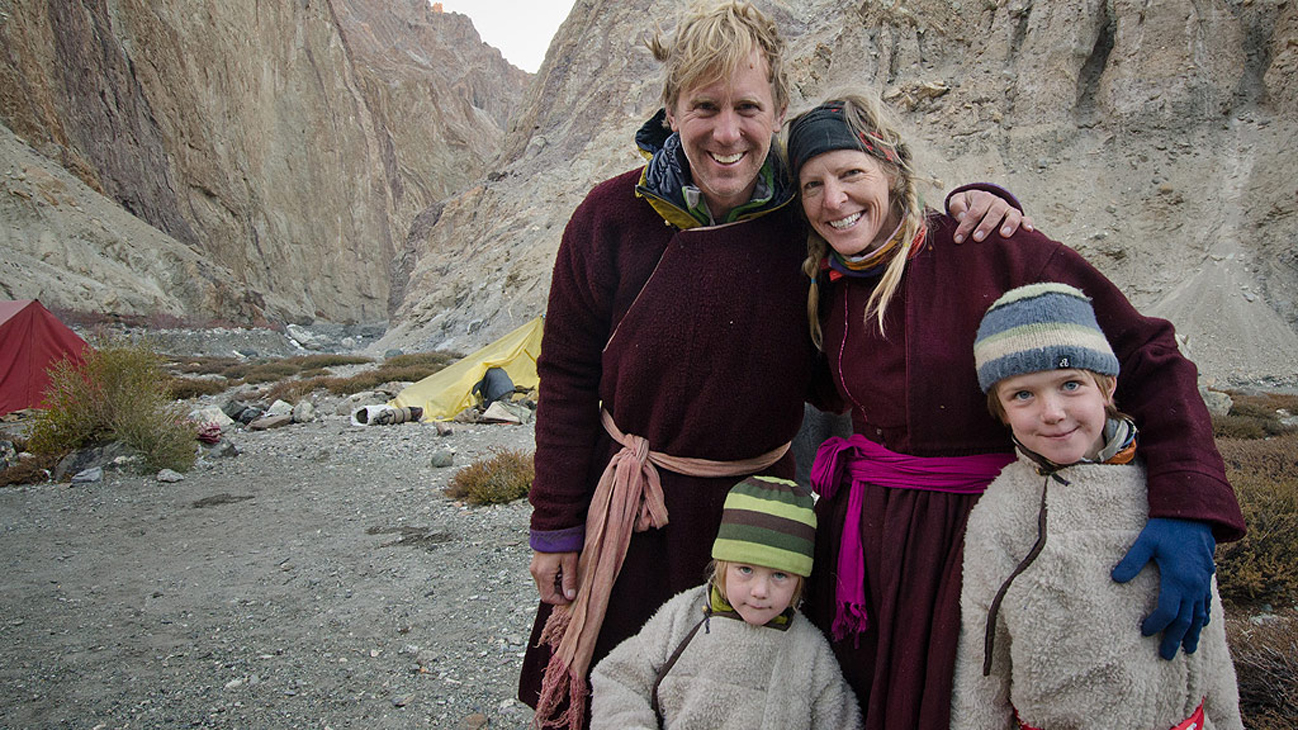Trekking through the Himalaya, with a short stop at Mt. Everest’s base camp, sailing the Ganges River, crossing the North Pacific Ocean on a container ship, meditating with monks in a Tibetan monastery – these are not the typical activities you might expect during a family vacation with two young children. Bruce Kirkby took an extraordinary adventure halfway around the world, and has invited everyone to come along. His new reality television program, Big Crazy Family Adventure, is a nine-part series that takes viewers through the most intense and eye-opening moments of the family’s expedition. ABC News talked to Bruce and his wife, Christine, about the trip:
One Canadian family went on the adventure of a lifetime, from hiking India’s Shingo La Pass to exploring the Great Wall of China, to meditating with a Tibetan monk and enjoying fried scorpions, all without ever getting on an airplane.
It was the ultimate road trip for adventure photographer Bruce Kirkby, his wife Christine Pitkanen, and their two young sons, 3-year-old Taj and 7-year-old Bodi, who is on the autism spectrum.
From their home base in British Columbia, Canada, the family traveled across seven countries, 13,000 miles and 96 days to the Karsha Gompa monastery in Ladakh, India, only using non-traditional forms of travel.
“We could have just flown, but in a way, airlines, you know, they’re this magical thing and they diminish time and distance and effort,” Kirkby said. “There just seemed to be this romance about a great travel to the other side of the earth with taking ships and trains and rickshaws and elephants.”
Bruce and Christine said they were both experienced travelers when they met and once they had kids they “just kept traveling.”
“We kind of started with smaller [trips], and we were finding when we went away on a trip, we got to know our boys better. We connected with them more,” Kirkby said. “The bigger the trips we went on, the closer we got with the boys.”
Travel Channel documented the family’s journey every step of the way for a new show called “Big Crazy Family Adventure,” which airs Sundays at 9 p.m. ET on Travel Channel.
The family set off last May in canoes from their home in the Canadian Rockies, leaving behind anything they couldn’t fit into their backpacks.
The only plans they had were no plans. They said all their traveling was done on the fly, except for the tickets they purchased for a grueling 16-day journey across the Pacific Ocean on a cargo ship.
The family was the only civilians on board, and it wasn’t smooth sailing. They were tested when their ship, originally destined for South Korea, unexpectedly detoured and anchored off the coast of Russia.
“Halfway across the north Pacific, the captain received a radio call that fuel had gone wildly discounted in Russia, and this makes a big deal, because filling the ship costs several million dollars,” Bruce Kirkby said.
So the captain stopped to take advantage of the cheaper fuel, but that unexpected stop created a headache for the family.
“We didn’t have Russian visas, which caused the Russian Port Authority to go crazy,” Kirkby said.
It was a journey they wouldn’t have passed up, but as all parents know, the one thing you can count on when traveling with kids is that they are bound to get sick.
When the family was in China, Taj showed signs of altitude sickness and they had to find a lower elevation. Then, in India, Taj got a fever that required immediate medical attention, so the family had to stop and find a doctor, who put him on antibiotics.
But despite these unexpected delays, the Kirkbys said they felt prepared.
“We packed an extensive first aid kit,” Pitkanen said. “We have a doctor friend and we got a big list of what the potential problem could be and what to give them.”
“I’ve been a guide for 25 years … a wilderness first responder,” Kirkby added. “I felt really comfortable … [that if] something did go really wrong, not only with our boys but anyone we were traveling with, that we would be able to get them to better treatment.”
While crisscrossing the globe, the family said they tried to maintain some structure in their kids’ routines where they could.
“We always have a bedtime routine, and their stuffies, and their favorite water bottle, so there’s a way each night of kind of recreating home,” Bruce said.
Routine was “extra important” for Bodi, he added, because he’s on the autism spectrum.
“We see his anxiety go down on trips we’re constantly present with him,” Kirkby said. “I think the impression is when you travel with you children, there’s so much change, so much upheaval, so much thrown at them, but I think there’s even more sameness, and so he finds a real comfort in the day-to-day routine of a long journey.”
“Every day you get up, you eat, you move, you go back to your hotel, you eat, you sleep, you get up. Eat, move,” Pitkanen added.
Bruce and Christine pushed the envelope in a way most parents would never dream of doing, but they say with some preparation and research, anyone can do an extreme family adventure like theirs.
“I think we have this bad perception in North America that [travel is] just this thing to be avoided at all, it’s really torturous,” Kirkby said. “The kids have enough sleep and enough good food, which are things you tend to throw out if you abandon routine, but if they have that, they can handle anything. They can handle all the ups and downs of travel.”
And the family is already planning their next trip.
“The funny thing was I actually asked Bodi the other day where he wanted to go next, and he said, ‘Antarctica,”’ Pitkanen said, laughing. “So he’s throwing down the gauntlet.”

